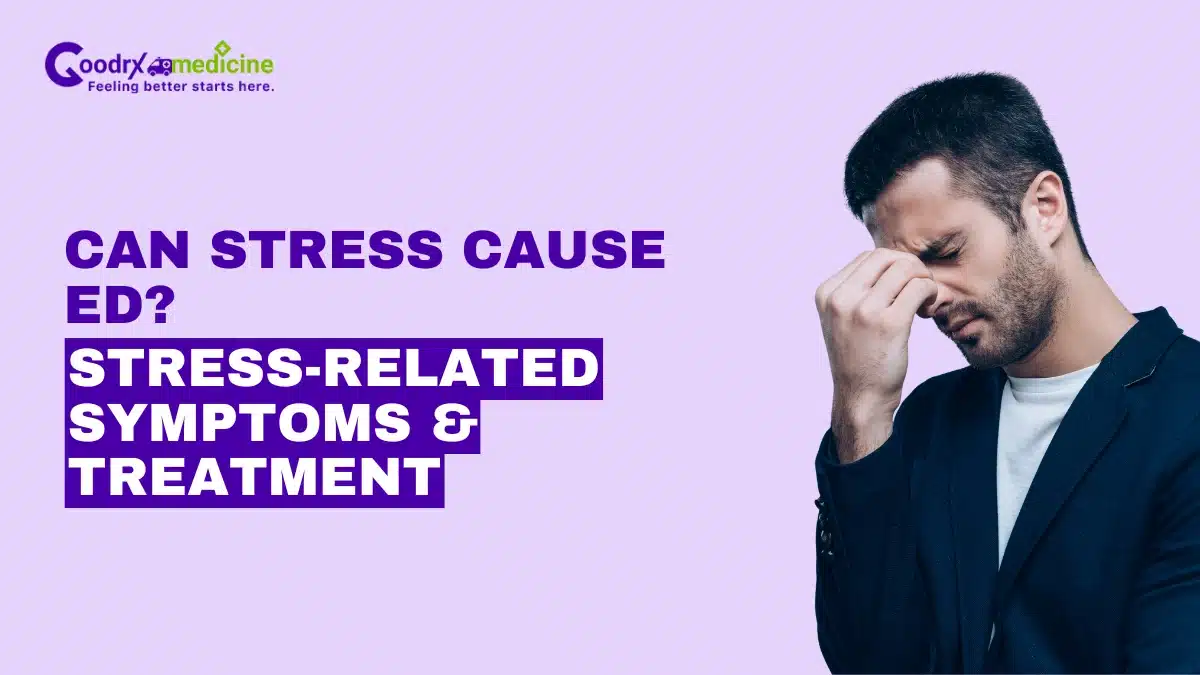Erectile Dysfunction (ED) isn’t just a physical issue; it often has a lot to do with what’s going on in your mind as well. Psychological factors, especially stress, are a major but often overlooked cause of temporary ED. You might be surprised at how everyday worries can upset the balance of hormones, affect blood flow, or disrupt signals for arousal.
In this article, we will discuss how can stress cause ED and highlight key anxiety symptoms to watch for. More importantly, we will equip you with practical strategies to combat stress-causing ED effectively. From lifestyle changes you can start today to medical help, keep reading to learn how to take charge of your sexual well-being.
Can stress and anxiety cause ED?
Yes, both stress and anxiety can cause Erectile Dysfunction.
When you are stressed, your body releases cortisol and adrenaline. These hormones constrict blood vessels and reduce testosterone production. This, in turn, interferes with the blood flow and hormonal balance required for a sustained erection.
Some everyday triggers that interfere with the part of the nervous system that controls sexual arousal include:
- Financial or work-related pressures
- Relationship issues
- Health anxiety
- Sexual performance anxiety
- Chronic worrying or overthinking
If erectile difficulties mostly occur when you are under stress or with a partner but not alone, it may have psychological reasons. This is commonly referred to as Psychogenic ED in clinical practice, which is different from organic ED.
Save up to 90% on your medicine bills

Cenforce 100 mg

Cenforce 200 mg

Kamagra Oral Jelly Rx 100 mg

Vidalista 60 mg
What is stress-induced Erectile Dysfunction?
Stress-induced ED refers to difficulty in achieving or maintaining an erection due to psychological distress. Unlike physical causes, such as Diabetes or cardiovascular disease, stress-related impotence stems from mental and emotional strain, which interferes with the brain-body connection essential for sexual arousal.
Both short-term anxiety and chronic stress can disrupt your body’s ability to have or maintain an erection, causing impotence.
According to a 2022 study, almost all impotence cases have a mental health component, with 85.2% males under the age of 40 reporting psychogenic ED, as opposed to 59.3% patients above the age of 40 diagnosed with organic ED.
How does stress cause ED?
Stress affects multiple systems in your body, and ED is often the result of a combination of physical and psychological changes. It can:
- Tighten pelvic floor muscles, leading to impaired sexual response.
- Disrupt signals between the brain and body during arousal.
- Lower testosterone levels, impacting sex drive or libido.
- Make you distracted or anxious, undermining confidence in the bedroom.
Over time, these factors can also lead to reduced sexual confidence, creating a vicious cycle of low confidence and recurring ED.
What are the signs of ED caused by stress?
Stress-induced ED often presents itself with symptoms that distinguish it from physical causes. These include:
- Erections during sleep or masturbation remain normal, while difficulty arises only during partnered sex.
- Inconsistent erections, which means they come and go randomly.
- Worsened ED symptoms during periods of mental or emotional stress.
- Feeling mentally distracted, anxious, or overwhelmed before sex.
It’s important to note that these are not the only signs of ED and can vary from person to person. Consult a healthcare professional for proper guidance and support.
How to treat ED caused by stress?
Stress-related Erectile Dysfunction is common but highly treatable. It requires a multi-faceted approach focused on reducing the mental load while supporting physical health.
1. Lifestyle & dietary changes
- Exercise regularly: Aim for at least 30 minutes of moderate exercise most days. It boosts your mood and improves blood flow, essential for healthy erections.
- Prioritize quality sleep: Get 7–9 hours nightly, as poor sleep increases stress hormones and can worsen ED.
- Limit alcohol & smoking: Too much alcohol, excessive smoking or recreational drug use can worsen both stress and erectile problems.
- Eat a balanced diet: Focus on fruits, vegetables, whole grains, and lean protein to support cardiovascular and sexual health.
2. Stress reduction techniques
- Mindfulness & meditation: Daily mindfulness or breathing exercises can help calm anxiety that disrupts sexual performance.
- Relaxation practices: Yoga, stretching, or tai chi can reduce muscle tension and stress.
- Time management: Make time for relaxation and don’t overload your daily routine. Writing in a journal when you feel overwhelmed can also help.
3. Open communication
- Talk with your partner: Share concerns and discuss what feels good, what worries you, and any sexual anxieties. This can reduce performance pressure and deepen intimacy.
- Seek couples counseling: If stress or ED is straining your relationship, a therapist can facilitate healthier communication and emotional connection.
4. Professional therapy
- Counseling: A mental health professional can help you manage stress, anxiety, depression, or work/life issues contributing to ED.
- Sex therapy: Specially trained therapists can address performance anxiety, low self-esteem, or sexual confidence issues.
5. Medications
- ED medications: Doctors often prescribe oral Erectile Dysfunction pills like Sildenafil (Viagra), Tadalafil (Cialis), or Vardenafil (Levitra) for ED.
- Depression & Anxiety treatment: If you have underlying depression or anxiety, your doctor may recommend prescription medications.
Stress ED test: What you need to know?
If you are wondering whether stress is contributing to your Erectile Dysfunction ED, a basic self-assessment or clinical evaluation will help provide clarity.
If you answer ‘Yes’ to these questions, it is most likely that you are suffering from stress-induced ED:
- Do you experience normal erections during sleep?
- Did the symptoms begin around a stressful event, like before a big presentation or after a fight with your partner?
- Do you feel sexual performance anxiety with your partner?
- Do difficulties occur primarily during partnered sexual activity, but not during solo activities?
- Are you sure no underlying chronic medical conditions could be causing ED?
For a formal diagnosis, doctors may perform a Nocturnal Penile Tumescence (NPT) test, where erections are monitored overnight or assess your psychological history.
When to see a doctor for ED?
You should consult a healthcare professional if:
- Erectile difficulties persist beyond a few weeks.
- You notice accompanying symptoms such as decreased libido, persistent low mood, or sleep problems.
- ED negatively impacts your self-esteem or interpersonal relationships.
- You have known risk factors like Diabetes, cardiovascular disease, or Hypertension.
- You feel concerned, anxious, or uncertain about the cause of your symptoms.
Early evaluation will not only help treat ED, but also uncover and manage other health issues. Feel free to discuss the same openly with a urologist or GP.
Conclusion
While stress can quietly undermine your sexual health, it doesn’t have to define your sexual experiences. Stress-induced ED is both common and highly treatable. The good news is that it is often reversible.
By making small lifestyle changes, seeking therapy, and using medications as needed, many men have found lasting improvement. With proactive steps and learning when to seek support, you can too. Support from your partner will go a long way in your journey towards improved sexual performance & intimacy.

Frequently Asked Questions
Can I get sudden Erectile Dysfunction?
Yes, you can get sudden ED or difficulty in achieving or maintaining an erection unexpectedly. It can occur even if no such instances have happened previously. It is mostly temporary and can be treated with exercise, therapy and medications.
Does financial stress, work stress or emotional stress cause ED?
Yes, any type of stress can cause ED by increasing hormones that restrict blood flow, lowering testosterone, and disrupting brain-body signals. It can also lead to anxiety, low mood, or performance pressure during intimacy, making it even more difficult to achieve or maintain an erection.
Can depression and anxiety cause Erectile Dysfunction?
Yes, both conditions are closely linked to ED due to hormonal changes and reduced libido. Conversely, Erectile Dysfunction can cause depression, affect self-esteem and overall confidence. There exists a bi-directional relationship between the two.
Does Cialis work for stress-related ED?
Cialis (Tadalafil) can help improve sexual function, but it is most effective when combined with stress-reducing strategies or therapy. Other FDA-approved options include Sildenafil, Vardenafil and Avanafil.
Can ED pills help if the root cause is stress?
Yes, Erectile Dysfunction pills like Cialis or Viagra may temporarily improve blood flow, allowing you to regain confidence. However, if stress is the root cause, combine the right ED pill with lifestyle changes for the best results.
Can therapy or counseling help with ED?
Yes, sex therapy, Cognitive Behavioral Therapy (CBT), and couples counseling are highly effective for psychological Erectile Dysfunction. These approaches will help reframe negative thoughts and address performance anxiety.
When referencing outside resources, GoodrxMedicine always provides full citations. To learn more about the measures we use to maintain the quality of our content, please review our Content Information Policy.











